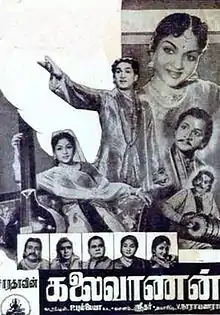Kalaivaanan
Kalaivaanan (Tamil: கலைவாணன்) is 1959 Indian Tamil-language devotional biographical film, based on the life of Karnataka poet Kaasinath, produced by Vasireddy Narayana Rao under the Sarada Productions banner and directed by P. Pullaiah. It stars A. Nageswara Rao, Anjali Devi in the lead roles and music composed by Pendyala Nageswara Rao. The film is a remake of the Marathi film Lokshahir Ram Joshi (1947), in Hindi as Matwala Shayar Ram Joshi and simultaneously released in Telugu as Jayabheri
| Kalaivanaan கலைவாணன் | |
|---|---|
 Theatrical release poster | |
| Directed by | P. Pullaiah |
| Produced by | Vasireddy Narayana Rao |
| Written by | Acharya Atreya |
| Based on | Life of Kaasinath |
| Starring | A. Nageswara Rao Anjali Devi |
| Music by | Pendyala Nageswara Rao |
| Cinematography | P. L. Roy |
| Edited by | R. Devarajan |
Production company | Sarada Productions |
Release date |
|
Running time | 171 minutes |
| Country | India |
| Language | Tamil |
Plot
The film begins 1600-1700 during the Vijayanagara empire at a place Vidyanagaram the hometown of high scholars & elite communities where Kasinatha Sastry (Akkineni Nageswara Rao) an orthodox brahmin brought up by his elder brother Viswanatha Sastry & sister-in-law Annapurna. Once a low caste Bhagavatar's called Bhachanollu visits Vidyanagaram in which an extraordinary dancer Manjulavani challenges the people of Vidyanagaram when Kasi competes and wins. Knowing it, Viswambhara Sastry the mentor of Kasi chides him that he has dragged Goddess Saraswati into the streets. Here, Kasi argues that art does not have any caste or community it should hold the public admiration when Viswambhara Sastry becomes furious and necks Kasi out. Being cognizant of it, Viswanatha Sastry berates and forcibly makes Kasi to apologize the mentor. Thereafter, Kasi & Manju fall for each other and gives a show ignoring the ordinance of village heads & his elders for which he has been ostracized from the religion. Soon, Kasi marries Manju and beloved by the public all over the country with their performances. At that juncture, King Vijayananda Ramagajapati impressed and invites them to his kingdom where Dharmadhikari narrates the story of Kasi. Affirms, Kasi is ineligible for the honor when Kasi strives and gains victory over all the scholars in the council when he is accoladed. Even Viswambhara Sastry too appreciates him. Keeping that grudge in mind Dharmadhikari ploys using court dancer Amurthamba who clutches him into a spoiled brat. Once, drunken Kasi unable to sing in the court, so, King makes his prison when Manju arrives on time and breaks the conspiracy of Dharmadhikari. Later Kasi & Manju returns to Vidyanagaram, but Kasi cannot get rid off his vices, loses his wealth and start ill-treating Manju. Learning it, Annapurna reaches Kasi secretly, upbraids which makes him repent and reform. On her back, Viswanatha Sastry does not allow her, so, she commits suicide when Kasi & Manju gets back her with their devotional power. At last, the entire society realizes the couple's eminence and pleads guilty. Finally, the movie ends a happy note.
Cast
Cast according to the song book[1]
|
|
Crew
- Art: G. V. Subba Rao, S. Krishna Rao
- Choreography: Vempati
- Dialogues: Acharya Atreya
- Playback: Ghantasala, T. M. Soundararajan, Seerkazhi Govindarajan, M. Balamuralikrishna, Thiruchi Loganathan, P. B. Sreenivas, S. C. Krishnan, M. L. Vasanthakumari, Jikki, P. Suseela, S. Janaki A. G. Rathnamala.
- Lyrics: Ambikapathi Kovai, Thanjai N. Ramaiah Dass, Kambadasan, Pattukkottai Kalyanasundaram, A. Maruthakasi, Pazhanichami
- Music: Pendyala Nageswara Rao
- Editor: R. Devarajan
- Cinematography: P. L. Roy
- Producer: Vasireddy Narayana Rao
- Screenplay - Director: P. Pullaiah
- Banner: Sarada Productions
- Release Date: 9 April 1959
Production
The film was shot at Vauhini Studios.
Soundtrack
The music was composed by Pendyala Nageswara Rao.
| No. | Song | Singers | Lyrics | Length (m:ss) |
|---|---|---|---|---|
| 1 | "Aayakalaigal Arupathu Nankinaiyum" | Thiruchi Loganathan | Amibapathi Kovai | 00:41 |
| 2 | "Kalai Saradha Devi En Thaye" | Ghantasala, P. B. Sreenivas, Panigrahi | Ramaiah Das | 04:25 |
| 3 | "Irukkirara Ingirukkirara Enai" | P. Susheela | Ramaiah Das | 04:11 |
| 4 | "Saval Savalendru" | T. M. Soundararajan & Jikki | Pattukkottai Kalyanasundaram | 08:02 |
| 5 | "Aadum Mayil Nee Vaa" | Ghantasala | Kambadasan | 04:45 |
| 6 | "Varaye Nanda Murali" | Ghantasala & P. Susheela | A. Maruthakasi | 04:37 |
| 7 | "En Kannil Ambum Undu" | Seerkazhi Govindarajan, P. Susheela | A. Maruthakasi | 03:43 |
| 8 | "Vennaiyai Thirudithindru" | S. C. Krishnan & Janaki | Pazhanichami | 04:24 |
| 9 | "Sikkadha Meenum Vandhu Sikkavenum" | T. M. Soundararajan, Thiruchi Loganathan & P. Susheela | A. Maruthakasi | 07:08 |
| 10 | "Alumarase Unatharul Vizhipparvai" | Seerkazhi Govindarajan | A. Maruthakasi | 06:12 |
| 11 | "Kadhal Silai Aadudhe" | M. L. Vasanthakumari | Thanjai Ramaiah Das | 04:47 |
| 12 | "Anandavan Bhaitappile Athiyile" | T. M. Soundararajan | A. Maruthakasi | 06:47 |
| 13 | "Dheivam Nee Dhana Dharmam Nee Dhana" | T. M. Soundararajan & P. Susheela | A. Maruthakasi | 02:15 |
References
- Kalaivanan song book (in Tamil). Chennai: Ideal Printers, Chennai-1.
External links
- Kalaivaanan at IMDb
- Kalaivaanan Titles on YouTube
- Randor Guy (18 October 2014). "Blast from the past: Kalaivaanan 1959". The Hindu. Archived from the original on 1 November 2016.
- Kalaivanan on Moviebuff.com
